- Home
- Edward Cline
Jack Frake
Jack Frake Read online
SPARROWHAWK
JACK FRAKE
Book One in the Sparrowhawk Series
A novel by
EDWARD CLINE
ebook ISBN: 978-1-59692-943-2
M P Publishing Limited
12 Strathallan Crescent
Douglas
Isle of Man
IM2 4NR
British Isles
Telephone: +44 (0)1624 618672
email: [email protected]
Originally published by:
MacAdam/Cage Publishing
155 Sansome Street, Suite 620
San Francisco, CA 94104
www.macadamcage.com
Copyright © 2001 by Edward Cline
ALL RIGHTS RESERVED.
Library of Congress Cataloging-in-Publication Data
Cline, Edward, 1946 —
Sparrowhawk—Jack Frake : a novel / by Edward Cline.
28 chapters — (Sparrowhawk ; bk. 1)
ISBN: 1-931561-00-1 (alk. paper)
1. United States—History—Colonial period, ca. 1600-1775—Fiction.
2. Great Britain—History—george II, 1727-1760—Fiction.
3. Immigrants—Fiction. 4. Smugglers—Fiction. 5. Boys—Fiction.
I. Title. II. Title: Jack Frake.
GSH 2010
Book design by Dorothy Carico Smith.
Publisher’s Note: This is a work of fiction. Names, characters, places, and incidents either are the product of the author’s imagination or are used fictitiously. Any resemblance to actual events, locales, or persons, living or dead, is entirely coincidental.
Acknowledgments
I am indebted, first and foremost, to two individuals, no longer with us. One confirmed my approach to life, the other confirmed its direction: Ayn Rand, the novelist-philosopher, whose novels I discovered, when a teenager, in the vandalized library of a suburban Pittsburgh boys’ home; and David Lean, the British director, whose Lawrence of Arabia I saw the same year, an event that cemented my ambition to become a novelist.
Special fond thanks go to Wayne Barrett, former editor of the Colonial Williamsburg Journal, who was certain this novel would see the light of day after having read the first page long ago; and to the BookPress in Williamsburg, whose partners, John Ballinger and John Curtis, also encouraged me and allowed me to rummage through their valuable stock on the track of ideas and materials.
Further debts of thanks are owed to the staff and past and current directors of the John D. Rockefeller, Jr. Library at Colonial Williamsburg for their assistance; to many of Colonial Williamsburg’s costumed “interpreters,” too numerous to name here, for the passion, lore, and information they imparted; and to the staff of the Earl Gregg Swem Library at the College of William & Mary, Williamsburg.
Pat Walsh, editor, together with Robert Tindall and John Gray, have my gratitude for their incisive suggestions and innumerable corrections, and for sharing my confidence that this novel will find a large and appreciative readership.
Lastly, I owe a debt of thanks to the Founders for having given me something worth writing about, and a country in which to write it.
The special province of drama “is to create… action… which springs
from the past but is directed toward the future and is always
great with things to come.”
— Aristotle, On Drama
CONTENTS
Chapter 1: The Map
Chapter 2: The Cottage
Chapter 3: The Cubbyhole
Chapter 4: The Spirits
Chapter 5: The Globe
Chapter 6: The Sea Siren
Chapter 7: The Impostor
Chapter 8: The Skelly Men
Chapter 9: The Caves
Chapter 10: The Covenant
Chapter 11: The Career
Chapter 12: The Commissioner Extraordinary
Chapter 13: The Proclamation
Chapter 14: The Laughing Lamb
Chapter 15: The Stagecoach
Chapter 16: The Highwaymen
Chapter 17: The City
Chapter 18: The Betrayal
Chapter 19: The Tour
Chapter 20: The Courier
Chapter 21: The Spy
Chapter 22: The Trap
Chapter 23: The Major
Chapter 24: The World Turned Upside Down
Chapter 25: The Prisoners
Chapter 26: The Plea
Chapter 27: The Trial
Chapter 28: The Conquering Hero
Epilogue: The Sparrowhawk
1744
Chapter 1: The Map
IT IS WHEN THE FOG CLEARS, AND THE MOON AND THE STARS ARE BRILLIANT, and the white sails of faraway ships on an invisible horizon are sharp and almost luminescent as they glide past on their grand, unknown errands, that a boy of ten may take stock of himself and of the world he knows. This is a quiet, precious time; he knows that the world is not so much focused on him, as he on it, through a special lens in his inchoate soul. The brevity and suddenness of this moment, which strikes without warning such souls as do not submit to the intrusive humdrum of their daily lives, signals its own importance, for its incandescent violence must make one passionately certain that one is a worthy crucible.
Jack Frake was a boy of ten, and tonight he was such a crucible.
The wind that gusted around him in the cubbyhole of rocks, on the edge of a cliff high over the shore below, surged through the coarse material of his clothing and chilled him so that he shivered. But the uncontrollable spasms in his knees and shoulders made him aware only that this same wind drove the distant sails and lifted their pennants and banners to snap proudly in the cold air.
The charge that ignited the moment for him was a map, the first he had ever seen. He had learned some hours ago that he lived in Cornwall, and that his secret cubbyhole sat precisely on the southern edge of a great island, England. Where before he had been aware only of the hills, fields and cliffs on the one side, and the ocean on the other, now he held in his mind an abstraction, and it was drawn from a part of the world he knew. Beyond that tiny realm lay the thrilling, unexplored empire of the island. The island itself was big enough for his ambition; he had the crazy notion that he could run along the path of its outline from the point where he sat and return to it days later from the opposite direction, not to impress himself with the magnitude of the island, but to prove his joyful possession of it.
The map belonged to Robert Parmley, rector of the parish of St. Gwynn-by-Godolphin, whose church was a five-mile walk from Jack Frake’s home in Trelowe. The parson, once a rising authority on antiquities, was now a lonely, shunned old man whose indiscreet, risqué remarks decades ago on the private life of a prelate of the Church of England had been forgotten by both the prelate and the parson, but whose gravity was such that he had been condemned to permanent assignment in this spiritually bovine parish. Here he preached to sparsely attended services, helped the poor, infirm, and old when he could, and collected a few worn coppers, aside from tithes, from villagers and cottagers who could spare the time or the care to put their children under his tutelage.
From Jack Frake’s locally notorious parents he had exacted only a promise from them to appear regularly in church once a month. The promise was not kept — the parson suspected that Cephas and Huldah Frake merely wanted to be rid of the boy for a while — but Jack Frake was the brightest youth he had ever undertaken to introduce to the rudiments of reading, writing and ciphering, and so he was reluctant to ban the boy from the converted stable which served as a schoolhouse in the back of the rectory.
This afternoon the boy had done remarkably well in reading passages from Ecclesiastes, in copying words onto his slate as Parmley dictated them to his seven pupils, and in exercises in two-digit sub
traction. He felt a curiously clean duty — something verging on a desire — to reward him. Jack Frake’s progress had been relentless, while the other boys had to be re-drilled in the subjects over and over again. And so, when he had dismissed the six other boys for the day, Parmley pulled out from his makeshift desk a great book of maps. The book had been sent to him, many years before, by his brother, a successful printer and cartographer in London.
He had put the book there weeks since, knowing that the reward was inevitable. Cephas Frake was now laboring for the union of workhouses of St. Gwynn-by-Godolphin, Gwynnford, Clegg, and Squillante parishes. The boy knew that Parmley had arranged for his father to work through the parish, yet the father would not tell his son where he was laboring on any given day. The boy had asked the parson, bluntly, in private, a number of times over the past year, why his father was so secretive, but Parmley could offer no explanation that would not exacerbate the boy’s unhappy domestic situation. Cephas Frake, he knew, was ashamed that his circumstances were so desperate that he was forced to plead pauperism in order to feed his family.
Parmley propped the book up against others on his desk, and let the map dangle as he stood by it. Jack Frake gripped the edges of his bench and stared at the colored phenomenon. The parson pointed with his finger to a cream-colored shape that resembled a ragged leg of mutton. “This is our land,” he said, “our island. England.” His finger moved to rest on one tiny area at the very bottom of the mutton leg close to a vast expanse of green. “And here we are. England is composed of numerous counties. We reside here, in Cornwall. A very lonely, but somewhat attractive county it is. This is the English Channel.” The finger then moved to rest on one of the innumerable, tiny, finely printed names that filled the space. “And here is where we live, in the parish of St. Gwynn-by-Godolphin. Godolphin, as you must know, is the name of the quite modest river that flows through Pendyn Valley to Gwynnford and the Channel — and was, coincidentally, the name of the late Queen Anne’s unfortunate lord treasurer. Our — your ancestors long ago gave it that name because some fishermen reported having seen dolphins frolicking in the estuary there. The river that goes to the dolphins. Do you see?”
Jack Frake nodded.
“And even longer ago, a monk named Gwynn lived in a hut somewhere near the river. He was a holy man, recognized by our church, the Anglican Church, who helped travelers cross the river. Thus, Gwynnford, a town perhaps a century older than our own St. Gwynn. Being directly on the Channel, the town is some miles removed from St. Gwynn’s original domicile. Gwynnford has seen better days,” he added with disapproval, thinking of the taverns and sailors’ hostelries that lined the little port’s main street, and of the good-natured but unpleasant rough-housing he had received there at the hands of some its habitués.
Jack Frake glanced up, expecting more.
Parmley felt an inner glow, and smiled. “Here is your home,” he continued, moving his finger west along the coast. “Trelowe. Its etymology is deceptively obvious, yet more than likely spurious. Perhaps it was so called after the stunted oaks that grow near your commons, but there are other, equally convincing apocryphal explanations. And to the east of St. Gwynn, the villages of Pondwrinkle and Clegg. South and east of us, Gwynnford. North of Trelowe, the village of Squillante. Ah, and here is Treethick! A great forest once stood in its fields. The farmers, I hear, still break their ploughs on the ancient stumps that are still in the soil. And close by it, Marvel.” He paused. “It is said that Marvel is the secret headquarters of that scoundrel, Augustus Skelly.” Parmley paused again to frown at the boy. “Have you ever seen smugglers, Mr. Frake?”
The boy shook his head. It was true. He had only heard of the smugglers. They were phantoms who moved in the night, as mysterious and frightening as the fantastic creatures his mother threatened him with if he did not obey. He had heard his parents and other adults in Trelowe talk in whispers among themselves about Augustus Skelly. Skelly and his men, they said, hanged customs officers and informers, and kidnapped children whom they fed to sea monsters so that the monsters would not molest the gang’s smuggling boats. But, as with the ogres and goblins in his mother’s arsenal of terror, he had never seen a Skelly man.
“And here,” continued the parson, pointing with his finger, “is Stanyard-on-Pendyn — Pendyn being the pretty little brook that feeds the Godolphin — ten miles west of Trelowe.” Parmley searched the boy’s face for signs of recognition. There was a tin mine in Stanyard, owned by a man who had a labor agreement with the union workhouses. Cephas Frake, he knew, was often sent there to load and push ore carts. “The ancient Romans, a people mightier than we, had a fort there, the ruins of which may still be seen. They, too, mined tin.”
Parmley paused in remembrance of something that pleased him, and took a large penny from his coat. He held it up. “Bronze, my boy. Part copper, part tin. Some of this coin may have come from those very mines.” He turned it over and showed the reverse to the boy. “Do you recognize her?”
Jack Frake nodded. On the reverse was the profile of a seated woman holding a spear in one hand, her other arm resting on an upright shield. She wore a great helmet with a curving crest.
“Do you think Britannia was a creation of His Majesty’s Mint?”
Jack Frake shrugged.
“Britannia is as old as the Romans,” continued the parson, unmindful of the fact that the content of his discourse had begun to range far beyond the boy’s knowledge and perhaps even his interest. But the boy was an attentive listener, and the parson was lonely for a receptive audience, and so he went on. “She first appeared on their coins during the reign of Antoninus Pius, in the second century. Our version here was modeled by Frances Stewart, the Duchess of Richmond, almost a century past. She must have been a noble, lovely lady. The pose and the style, however, are undeniably Greek in inspiration. Yet I had my own name for Britannia, when I was a young man at Oxford. I dubbed her ‘The Auditing Athena.’ Athena! The Romans called her Minerva. The goddess of wisdom and power. Does she not look like she is listening, weighing, and judging what she hears? I thought it appropriate that we should choose her as our symbol.” Parmley stopped for a moment, looking more abstractly pensive. “Wisdom and power, my boy,” he sighed. “The two notions are not antithetical, as some aver. It depends on one’s dictionary. Today, of course, they are in mutual disrepute: wisdom, because it reveals our failings and makes us jealous of it; and power, because it dispenses with the need for wisdom, and offers instead the spice of avarice. This is true all over, but especially in our England, in this anxious year of 1744. We, above all other nations, should know better, for are we not envied for our vaunted liberties?” Parmley studied his penny for a moment, then put it away. “But — I digress. That is the purpose of a symbol, to remind a man of his first meaning. To remind a nation, too. Someday, I hope, England will remember hers.” The parson glanced at the map, and sadly tapped it with his hand. He studied the boy, and wondered if any portion of his reverie had found a home in the young mind. “Names, Mr. Frake, are not casual. If ever you must choose a name or symbol for something important, think on it most earnestly.”
Jack Frake stood and approached the map. He put a tentative, wondering finger on the edge of the island and traced the coast of Cornwall. Then he stepped back to his bench and sat down.
The parson, however, was through for the day. He refolded the map, and slammed the book shut. “You may go now, Mr. Frake. When you return next week, I may show you what lies beyond the Channel.” He paused with a shadow of a grin. “I may show you a globe.”
He then received his own and quite unexpected reward. Jack Frake, who rarely volunteered a word more than what was required, and who Parmley, in spite of his affection for him, had concluded was the most introverted, ungrateful boy he had ever had in the schoolhouse, smiled up at him and said, “Thank you, sir,” then jumped up and ran out the door into the chill afternoon.
Chapter 2: The Cottage
WHAT NORMALLY TO
OK HIM TWO HOURS TO WALK, TODAY TOOK THREE. Jack Frake was neither eager to go home, nor anxious to get there before dusk. He set off mechanically from St. Gwynn-by-Godolphin on the country road that meandered through the fields, pastures and meadows that lay between the two villages, his mind and energy happily preoccupied. He was hungry, but the prospect of the bowl of gruel his mother would fix for him neither enticed nor repelled him. He was deaf to the pleadings of his stomach.
His thoughts did not include his home, which was a one-room cottage on the edge of Trelowe’s commons, half a mile from the cliff and the Channel; or his bed, which was a pallet of straw on the dirt floor in a corner of the cottage, between the fireplace and the woodbin; or his parents, whom he regarded as looming nemeses to his life.
Nor did his thoughts dwell on the risk of encountering highwaymen or kidnappers. He had nothing a highwayman could want, unless it were the crudely repaired shells of leather that were his shoes, or the patched and re-patched rags that were his trousers, shirt and jacket. And the peril of being taken by a gang of kidnappers to be sold ultimately as a servant to gentlemen in the colonies — wherever they were — was faintly intriguing to him, even alluring.
His parents used that threat, too, in addition to the ogres and goblins. “We could get a guinea for you, boy,” his father would say gruffly when he was in an especially foul mood. “So you mind your own nose and keep your mouth shut, or it’s off to the colonies with you!” His father disliked him, almost as though he were not his own son, but a special guest of his mother’s; his mother was indifferently tolerant of him, as though he were a penance she had accepted and worked into the daily drudgery of her life.
He understood these relationships as little as he did the one which existed between his parents. They argued often, and even fought with fists, pans and stoneware, drawing him, when they noticed him standing by as a spectator, into their bloody donnybrooks, whose points of contention were beneath his ken or care. What he witnessed between his parents was not what he imagined ought to be love and marriage. Reason, which his young mind was striving to enthrone in all matters that came under his purview, dictated that they should part and go their own ways. But their continued, embittered union defied reason and all his efforts to understand it. Jack Frake did not hate his parents. He simply was too young to grasp the role of enmity in the lives of adults such as Cephas and Huldah Frake. The word inertia was not yet in his vocabulary, but an unlabeled notion of it existed in his mind and it seemed to be the basis of his parents’ marriage. And he himself was a hostage to it by the unanswerable triumvirate of custom, law, and his youth.

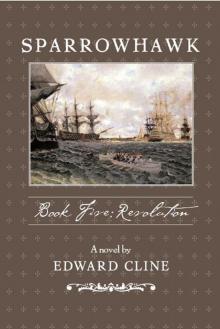 Revolution
Revolution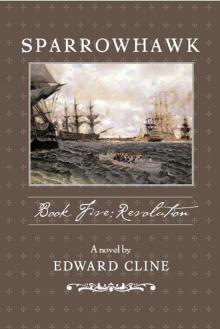 SH05_Revolution
SH05_Revolution War
War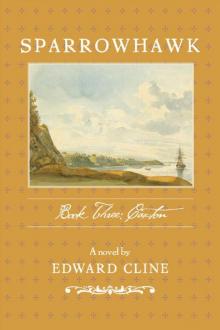 SH03_Sparrowhawk: Caxton
SH03_Sparrowhawk: Caxton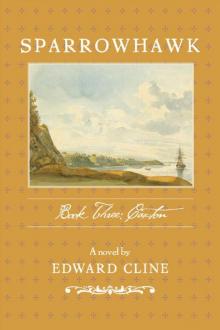 Sparrowhawk III
Sparrowhawk III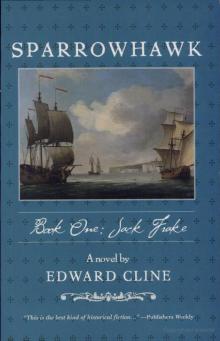 Jack Frake
Jack Frake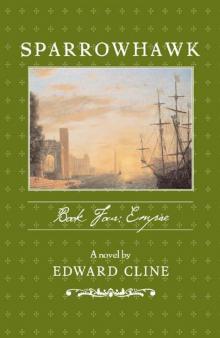 SH04_Empire
SH04_Empire Empire
Empire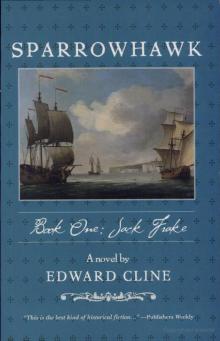 SH01_Jack Frake
SH01_Jack Frake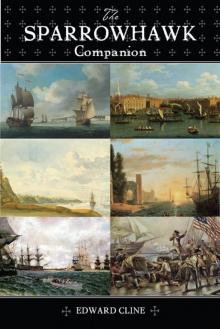 The Sparrowhawk Companion
The Sparrowhawk Companion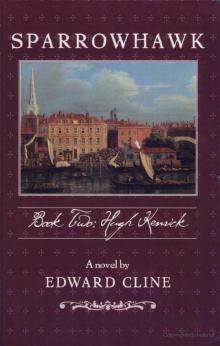 Hugh Kenrick
Hugh Kenrick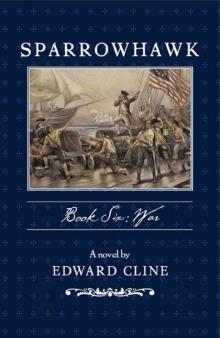 SH06_War
SH06_War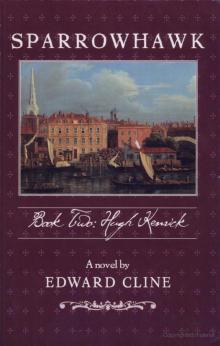 SH02_Hugh Kenrick
SH02_Hugh Kenrick